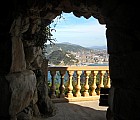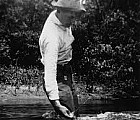Hadley and Paul with Hadley audio

I’m sure that many of you have read Alice Hunt Sokoloff’s book, “Hadley: The First Mrs. Hemingway.” I ordered my copy quite a while ago from a used book dealer online. I pulled it out again recently see how Alice had used the conversations from the Hadley Tapes in her book. I had forgotten that in my second hand copy, someone (I wish I knew who!) had scotch-taped Hadley’s obituary to the inside back cover. It is a small, faded newspaper clipping running just over a paragraph. Hadley’s obituary mentions her son Bumby (it actually says Bumby) and both of her marriages, as well as having “The Sun Also Rises” dedicated to her and being remembered fondly in “The Moveable Feast”.
Across from Hadley’s obit, on the inside back of the book jacket is a small bio of Alice Sokoloff, which states that she was an accomplished musician and has written two previous books. It looks like Hadley and Alice were neighbors not only in Chocorua, New Hampshire, but also in Lakeland Florida too, where Hadley died. The photo below is of the house in New Hampshire where Paul and Hadley lived and where (I think) these interviews took place. Paul’s son Richard lives there now, he is 99 years old. The photos on this blog are from the website about the life and career of Paul Mowrer, paulscottmowrer.
Richard Mowrer kindly gave me permission to use these photos, but he very humorously declined an interview.
 The next few tapes in the continuing conversation of Hadley and her friend Alice really jump around in subject. The tape recorder is turned off and on quite often, and it is impossible to know how much time lapses between their conversations. Looking at the dates, it may also be that the tapes were copied out of order. Most of the tapes were recorded in January and February of 1972, the winter after Paul died. Knowing this is interesting because not only does Hadley have the perspective of looking back on two marriages from start to finish, but she also has the liberty to give her own perspective of events. You will not be surprised to know that Hadley is gracious and loyal and generous to just about everyone in her life, no matter how they were to her. Her attitude is one of gratitude for all of her experiences in life, good and bad.
The next few tapes in the continuing conversation of Hadley and her friend Alice really jump around in subject. The tape recorder is turned off and on quite often, and it is impossible to know how much time lapses between their conversations. Looking at the dates, it may also be that the tapes were copied out of order. Most of the tapes were recorded in January and February of 1972, the winter after Paul died. Knowing this is interesting because not only does Hadley have the perspective of looking back on two marriages from start to finish, but she also has the liberty to give her own perspective of events. You will not be surprised to know that Hadley is gracious and loyal and generous to just about everyone in her life, no matter how they were to her. Her attitude is one of gratitude for all of her experiences in life, good and bad.
Alice starts by asking Hadley about how life was going for Ernest at the time she met him. Alice describes him as lost and floundering in Michigan after the war and his parents were quite disapproving of his lack of direction. “You came along at a fearfully critical moment in his life” Alice remarks, “when he could easily have dissipated all his energies.” Meeting Hadley, Alice suggests, saved him. While Hadley seems to agree, she lets Alice talk and only adds how handsome Hemingway was in his youth, “He was a beautiful physical specimen.” Not too long after saying this, Hadley asks Alice for reassurance, “You’re going to have a whole chapter on Paul?” she asks. This is a concern Hadley expresses several times throughout the tapes, that although her life’s story included Hemingway, her marriage to Paul was from 1933 until his death, a respectable 38 years (my words).
The tape recorder is turned off, and when their conversation resumes, they are talking about Paris. Hadley speaks of what a wonderful French gentleman Tonton was, and how much he and his wife Marie (who was their cook) loved Bumby. “He soldiered all over the world” says Hadley and they were “deeply interested in Bumby”. Bumby knew quite a lot of French because of his relationship to Tonton and they taught him his address by making up a little song. This is one of the moments I want to post online for you; the moment when Hadley sings the little song that Bumby learned in French.
Alice comments that after they returned to Paris from Toronto, she and Ernest were more social. They met Scott and Zelda Fitzgerald and Sara and Gerald Murphy at this time. Alice asks Hadley if Ernest was more ambitious when they returned to France, because the kind of people they were meeting were wealthier and more influential. “It was well not to accept all the amenities they could produce” Hadley said, saying that although their new friends could take them for dinner anywhere in Paris, she and Ernest stayed with the bistros; “we liked red beans and beer.” Hadley enjoyed Paris more the second time because she made friends easily because of Bumby. Hadley seemed pleased when she remembers one of the “Benchley bunch” telling her “you and Bumby are very becoming to each other.”
In the next tape, they seem to be talking about a time after Hadley and Paul were married and living in Chicago. Hadley mentions that she never met Paul’s mother but admired her because she did so much for her children’s education. In photos, Hadley describes her as “quite stunning looking with an interesting profile.” Alice asks about when Jack was a prisoner of war, and the lunch she had with Mary, who had discovered Jack’s whereabouts. She and Mary met in Chicago in a restaurant across the street from where she and Paul lived, Hadley thought that what Mary did was ‘very, very kind”.
For a moment Hadley drifts off subject and talks about Marty Gellhorn, describing her as ‘very alluring.” Hadley remembers seeing Martha in school and remembers that even as a young girl Martha stood out, she was ‘beautifully softened’ Hadley says. Martha visited Paul and Hadley in lake bluff. “She’s a real killer. (meaning beautiful) and very nice.” Alice remarks that it is “unusual and touching that you were friends with all of the subsequent administrations as you call them”. Hadley says, “Pauline, that took awhile.” What helped Hadley get along with Pauline was that ”I had to deliver Bumby part of that year and so many people have told me how good Pauline was to him – even getting him to write letters to mama” (meaning herself). “Who was next?” Hadley asks, meaning the next woman in Hemingway’s life. Martha Gellhorn, Alice answers. “Wasn’t there another one?” Hadley wonders. Oh, Jane Mason says Alice, but it wasn’t a marriage, “hmm, just a crush” says Hadley.
They talk for awhile of the marriage between Ernest and Martha and how bitterly it ended for both parties. Hadley says that Martha told Hadley she felt “very bad about losing him”. She was free and ambition Alice points out, and Hadley says, “Well, he was terribly lonely; he wrote me a piteous letter one night when she went to Finland” while she was writing for Colliers.
Would you have wanted to go back to Paris Alice asks, if she hadn’t met Paul? “No, I think I wanted something real” Hadley replies. Ernest visited Paul and Hadley sometime after the war. Ernest spoke affectionately of Paul and was glad the marriage was a good one. They speak of Paul’s integrity and sense of responsibility and the way he was organized and quiet, “He had a great sense of what he ought to do” Hadley says, “and he did it.” And with no fuss adds Alice, Paul had an inner security. Hadley tells Alice about the comment Ernest made about Paul being “A little too much like JC for my taste”. Hadley enjoyed this, “It’s priceless” Hadley chirps.

They talk of the years Hadley and Paul went back to France after the war to the house in the countryside. Hadley tells the story of when she and Paul found a whole bag of coffee beans at time when coffee was very hard to come by. They gave the coffee beans to their neighbors and waited to hear how much they had enjoyed the coffee. After a while, Paul finally asked about it and they found out that the neighbors, who loved animals, had used the coffee to help a cow give birth! Hadley really enjoys telling this story and mentions that Paul had written about it in the New York Post. Hadley enjoyed the countryside and remembered “the wonderful willow trees that turned all sorts of marvelous colors.” She said that she and Paul knew all of the nearby villages. Of Paul, she says, “He really made me happy.” Hadley says, “What a wonderful, wonderful man.”
Paul and Hadley Mowrer are buried in Choroura, New Hampshire. Paul was awarded the first Pulitzer Prize given for correspondence in 1928 “for his coverage of international affairs including the FrancoBritish Naval Pact and Germany’s campaign for revision of the Dawes Plan.” He was also the Poet Laureate for the state of New Hampshire. You can click on the photo below to enlarge it.

These tapes belong to the Ernest Hemingway Collection/John F. Kennedy Presidential Library and Museum, Boston






Another wonderful piece. Full of insight, humor and charm. Well-written and well-researched. Always heard that Paul was an upstanding guy and a very good journalist and writer himself. Thank you again and again for your wonderful blog, Allie! Keep up the great work.
Okay Allie, I think you need to call this the “Hadley Project” instead. Just kidding, I really liked this and I am glad that Hadley had such a good life with Paul. I have never seen a wedding picture of Hadley and Paul have you?
Nice job with the blog I know you are working hard.
Suz
I think it is poetic justice that Hadley had a such a good marriage with Paul for all those years. She seemed like a very loyal and steady person, a model partner. It’s disappointing to read about how deeply E. betrayed her, but she seems to have, in a sense, recovered from it more fully than he did.
Great job with the blogs, Allie. I look forward to the next one.
Hi Susan,
That’s a good point about the photos of Paul and Hadley. I’m going to ask around about the wedding pictures.
And hmmm, the Hadley Project, I’ll have to think about that?! Wouldn’t Hadley be surpised by how many people admire her and discuss her life so many years later?
Allie
Sorry to be MIA for so long.
Great post as always, Allie. Hadley is a charmer and I love your posts about her.
Looking forward to the next entry
I agree with you Matt. It seems like Ernest never fully moved on or forgave himself for doing what he did to Hadley. She probably never stopped loving Ernest but learnt so much and grew so strong that she could live the rest of her life in more peace than he did.
Loving every word!!!
Love the additional info about life after E.H. I’m happy that Hadley ifound affection and love with her second husband. I wonder how they met ? Great blog.
A.E. Hotchner’s “Hemingway in Love” — if Hotchner is to be believed — shows Hemingway completely regretting the loss of Hadley. Hotchner quotes Hemingway: “I want you to know Hadley, you’ll be the best part of any woman I write about. I’ll spend the rest of my life looking for you.” And why not! Much as we can revere Heminway’s writing, his behavior toward Hadley was terrible, whereas Hadley was lovely from all accounts, including Hemingway’s own.
Sustain the incredible job !! Lovin’ it!
Many thanks for sharing your neat web page
Chocorua is perhaps the spelling for the burial place of Hadley and Paul. It would likely match the name of the town, Chocorua, in which they lived. Interesting information, well presented, thank you.
Andy Sweeney
I wonder what kind of relationship Hadley had with Jack’s girls ( her granddaughters)